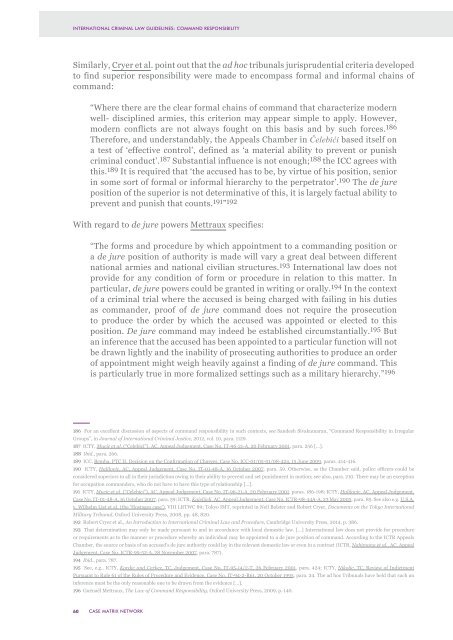Command Responsibility
CMN_ICL_Guidelines_Command_Responsibility_En
CMN_ICL_Guidelines_Command_Responsibility_En
You also want an ePaper? Increase the reach of your titles
YUMPU automatically turns print PDFs into web optimized ePapers that Google loves.
INTERNATIONAL CRIMINAL LAW GUIDELINES: COMMAND RESPONSIBILITY<br />
Similarly, Cryer et al. point out that the ad hoc tribunals jurisprudential criteria developed<br />
to find superior responsibility were made to encompass formal and informal chains of<br />
command:<br />
“Where there are the clear formal chains of command that characterize modern<br />
well- disciplined armies, this criterion may appear simple to apply. However,<br />
modern conflicts are not always fought on this basis and by such forces. 186<br />
Therefore, and understandably, the Appeals Chamber in Čelebići based itself on<br />
a test of ‘effective control’, defined as ‘a material ability to prevent or punish<br />
criminal conduct’. 187 Substantial influence is not enough; 188 the ICC agrees with<br />
this. 189 It is required that ‘the accused has to be, by virtue of his position, senior<br />
in some sort of formal or informal hierarchy to the perpetrator’. 190 The de jure<br />
position of the superior is not determinative of this, it is largely factual ability to<br />
prevent and punish that counts. 191 ” 192<br />
With regard to de jure powers Mettraux specifies:<br />
“The forms and procedure by which appointment to a commanding position or<br />
a de jure position of authority is made will vary a great deal between different<br />
national armies and national civilian structures. 193 International law does not<br />
provide for any condition of form or procedure in relation to this matter. In<br />
particular, de jure powers could be granted in writing or orally. 194 In the context<br />
of a criminal trial where the accused is being charged with failing in his duties<br />
as commander, proof of de jure command does not require the prosecution<br />
to produce the order by which the accused was appointed or elected to this<br />
position. De jure command may indeed be established circumstantially. 195 But<br />
an inference that the accused has been appointed to a particular function will not<br />
be drawn lightly and the inability of prosecuting authorities to produce an order<br />
of appointment might weigh heavily against a finding of de jure command. This<br />
is particularly true in more formalized settings such as a military hierarchy.” 196<br />
186 For an excellent discussion of aspects of command responsibility in such contexts, see Sandesh Sivakumaran, “<strong>Command</strong> <strong>Responsibility</strong> in Irregular<br />
Groups”, in Journal of International Criminal Justice, 2012, vol. 10, para. 1129.<br />
187 ICTY, Mucic et al. (“Celebici”), AC, Appeal Judgement, Case No. IT-96-21-A, 20 February 2001, para. 256 […].<br />
188 Ibid., para. 266.<br />
189 ICC, Bemba, PTC II, Decision on the Confirmation of Charges, Case No. ICC-01/05-01/08-424, 15 June 2009, paras. 414-416.<br />
190 ICTY, Halilovic, AC, Appeal Judgement, Case No. IT-01-48-A, 16 October 2007, para. 59. Otherwise, as the Chamber said, police officers could be<br />
considered superiors to all in their jurisdiction owing to their ability to prevent and set punishment in motion; see also, para. 210. There may be an exception<br />
for occupation commanders, who do not have to have this type of relationship […].<br />
191 ICTY, Mucic et al. (“Celebici”), AC, Appeal Judgement, Case No. IT-96-21-A, 20 February 2001, paras. 186-198; ICTY, Halilovic, AC, Appeal Judgement,<br />
Case No. IT-01-48-A, 16 October 2007, para. 59; ICTR, Kajelijeli, AC, Appeal Judgement, Case No. ICTR-98-44A-A, 23 May 2005, para. 85. See also e.g. U.S.A.<br />
v. Wilhelm List et al. (the ‘Hostages case’), VIII LRTWC 89; Tokyo IMT, reprinted in Neil Bolster and Robert Cryer, Documents on the Tokyo International<br />
Military Tribunal, Oxford University Press, 2008, pp. 48, 820.<br />
192 Robert Cryer et al., An Introduction to International Criminal Law and Procedure, Cambridge University Press, 2014, p. 386.<br />
193 That determination may only be made pursuant to and in accordance with local domestic law. […] International law does not provide for procedure<br />
or requirements as to the manner or procedure whereby an individual may be appointed to a de jure position of command. According to the ICTR Appeals<br />
Chamber, the source or basis of an accused’s de jure authority could lay in the relevant domestic law or even in a contract (ICTR, Nahimana et al., AC, Appeal<br />
Judgement, Case No. ICTR-99-52-A, 28 November 2007, para. 787).<br />
194 Ibid., para. 787.<br />
195 See, e.g., ICTY, Kordic and Cerkez, TC, Judgement, Case No. IT-95-14/2-T, 26 February 2001, para. 424; ICTY, Nikolic, TC, Review of Indictment<br />
Pursuant to Rule 61 of the Rules of Procedure and Evidence, Case No. IT-94-2-R61, 20 October 1995, para. 24. The ad hoc Tribunals have held that such an<br />
inference must be the only reasonable one to be drawn from the evidence […].<br />
196 Guénaël Mettraux, The Law of <strong>Command</strong> <strong>Responsibility</strong>, Oxford University Press, 2009, p. 140.<br />
60<br />
CASE MATRIX NETWORK


